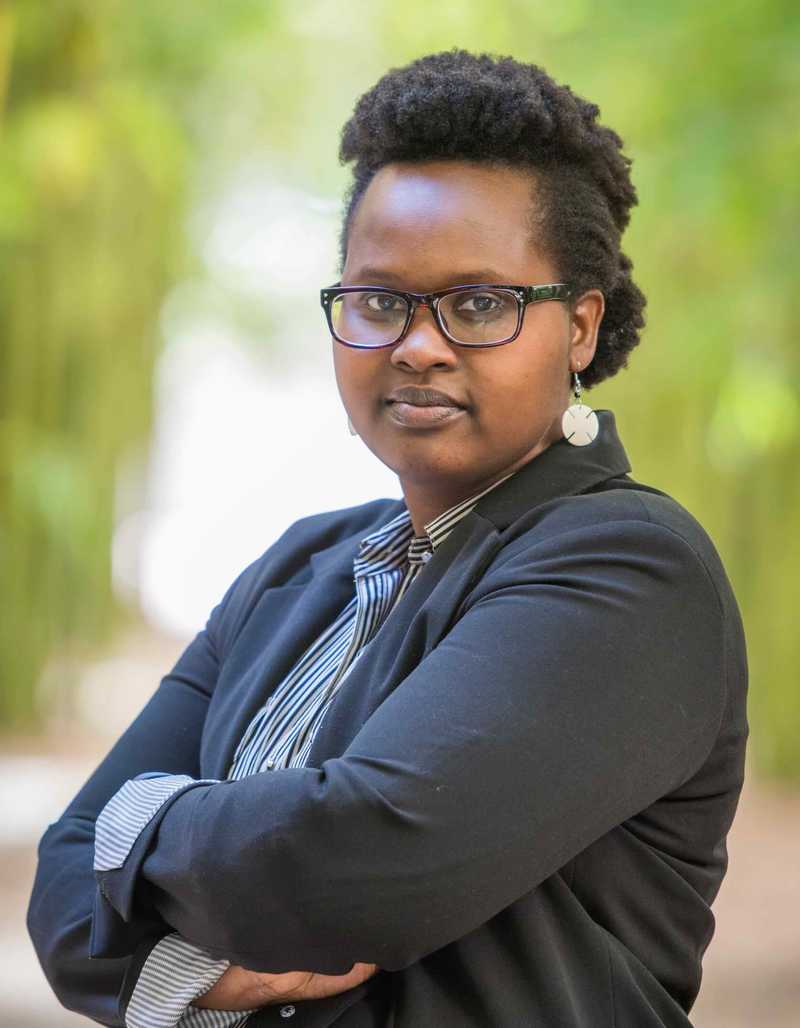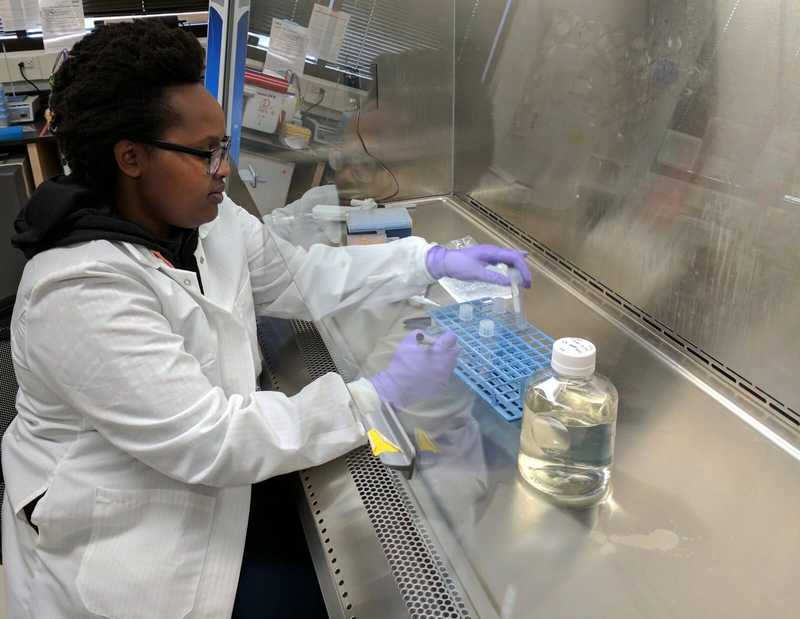
Share
Mireille Kamariza is currently a Junior Fellow at Harvard University and a postdoctoral researcher at the Broad Institute in Boston. Her research considers the development of new technologies that can be used to diagnose infectious diseases quickly and without the need for expensive machines. Dr. Kamariza is the Co-Founder of OliLux Biosciences, Inc., a company aiming to change the equation in the global tuberculosis (TB) public health crisis by developing a rapid, low-cost, and reliable solution for TB detection.
Dr. Kamariza went to the University of California, San Diego for her undergraduate studies in Biochemistry and Chemistry. She earned her Master's degree in Molecular and Cell Biology from the University of California, Berkeley. She then went to Stanford University to complete her Ph.D. in Biology. Unorthodoxly, in 2017, fortune named her one of the World's Most Powerful Women whilst she was still a graduate student. In 2020, Chemical & Engineering News named her one of its Talented 12 for her invention of a quick, low-cost test to detect tuberculosis. Being a star in the male-dominated biotech industry, she is making a difference by developing novel diagnostics, and devices for neglected diseases, thus, serving the underserved and underrepresented populations around the world.
Dr. Mireille Kamariza was born in Burundi and grew up in Burundi and Cameroon. In 2006, she moved to the US, after completing her elementary and high school studies in Cameroon and Burundi, respectively. The Africa I Know interviewed Dr. Kamariza to learn more about her journey, work, experience, and the advice she has for women and the younger generation.
 Photo credit: Mireille Kamariza
Photo credit: Mireille KamarizaOur ancestors worked hard for us, let's do the same for the next generation of Africans!
Thank you very much for agreeing to do this interview with us. Can you please introduce yourself to our readers? What do you do?
I work as a Junior Fellow at Harvard University and a postdoctoral researcher at the Broad Institute in Boston, USA. I research new technologies that can be used to diagnose infectious diseases quickly and without the need of expensive machines.
You have an impressive educational background. Can you tell us a little bit about it?
I grew up in Burundi and Cameroon. I did my elementary studies in Douala, Cameroon and high school in Bujumbura, Burundi. Then I moved to the US where I did my undergraduate studies at the University of California, San Diego and earned a bachelor's degree in biochemistry and chemistry. Then I completed a master's degree in molecular and cell biology from the University of California, Berkeley. Finally, I completed a doctorate degree in biology from Stanford University.
Did you have to pay for your studies? Did you have any financial burden on your education journey?
I'm fortunate to say that most of the school-related fees for my university and post-graduate studies were funded through scholarships, fellowships and work-study opportunities. At the beginning of university, soon after I moved to the US, I also worked in retail to cover my living expenses.
What were the main challenges you faced when you immigrated to the US? Have you encountered language barriers? If so, how did you overcome them?
I didn''t grow up speaking English so once I moved to the US, language was a strong barrier. So, I worked hard to learn the language as quickly as I could. I immersed myself in reading books written in English and made friends who could help me practice the language. It helped that I was surrounded by an English-speaking environment. Soon enough, I was catching up and understood the language well enough to succeed in school.
Health is a critical topic. Can you tell us what drew you to work in this field? What excites you the most about it?
The idea of finding solutions that can help eradicate curable infectious diseases is what motivates me. Europe and the U.S. have managed to eradicate most infectious diseases by having effective detection methods, creating vaccines, and highly effective medications. However, these technologies do not match the complex needs in developing countries anymore. We need new solutions tailored to today''s problems using modern technologies. I''m privileged to be in a position where I can contribute to the scientific output and I''m excited to see what the future holds.
What is your day-to-day work like? How do you organize yourself?
Nowadays, because of COVID, I spend most of my days working on the computer from home. Depending on the day, I''m either attending meetings or reading/writing scientific materials. No matter how busy I get with back-to-back meetings or the number of papers I have to write, I always try to reserve evenings for personal life. A healthy work-life balance is important to me and I try my best to ensure I stay connected with friends and family.
You are also the Co-Founder of OliLux Biosciences, Inc. Can you tell us the story of how your entrepreneurship journey begin? What were the challenges you face? How did you overcome them?
I was doing my PhD at Stanford University, which is at the heart of the Silicon Valley, a startup hub. There were many opportunities available to help students build business models and launch companies. My biggest hurdle was convincing potential investors that infectious diseases is an area that is worth investing in. It''s evident now with the advent of the pandemic, but pre-Covid, infectious diseases did not get much attention from private institutions.
How do you balance research at Harvard and your work at OliLux Biosciences?
Time management is key! I make sure to have an up-to-date calendar with deadlines highlighted so I can keep track of my schedule. I can easily forget meetings if they are not written in my calendar, especially now that everything is online.
What do you hope to achieve with OliLux Biosciences?
I hope to build and provide new diagnostic technologies that improve health everywhere, even in places with low resources.
You were featured in The Harvard Gazelle as "The star chemist" and named one of the world's most powerful women by Fortune magazine in 2017, while you were still a graduate student! How did you feel about it?
It was quite an honor! And a privilege to help bring the issue of tuberculosis to such a big platform. Covid has affected all of us in profound ways. But let''s not forget that before 2020, tuberculosis was the no. 1 infectious killer for many years and that more than 1 million people died from TB every year. I hope this article can serve as a reminder that tuberculosis is still around and may have an increased its toll due to the Covid crisis.
What advice can you give, regarding your journey to entrepreneurship, to the younger generation who wants to follow your steps?
Dream big and work hard! Someone once told me success is 90% hard work, 9% luck and 0.9% madness. It takes a little bit of thinking-out-the-box in order to achieve something new. Once you find what your passion is, embrace hard work, your inner creativity and collaborate widely. It takes a village to build a house, and it''s absolutely true with everything else in life!
What advice will you give to students who wish to build a career in science, especially women?
Practically speaking, higher education in the sciences is a great foundation for a career in the sciences. Outside of doing well in school, I recommend for students to search for opportunities in their environment for careers in the science field. There are lots of different areas in science (e.g., agriculture, climate change, nutrition, farming, etc.) that are available in all countries. Take advantage of those opportunities and look for internship spots. In the end, practical training is what gives the expertise necessary for a successful career.
How was it like growing up in Burundi? What do you miss and cherish most about Burundi and Africa?
So much! The people, the food, the music, etc. Burundi is a beautiful country with lots of luscious greeneries and beautiful lake shores. I definitely miss the weather and enjoying the food by the beach.
What is your motto in life?
“It always seems impossible until it''s done.” Quote by Nelson Mandela
What advice do you have for the African youth?
Our ancestors worked hard for us, let''s do the same for the next generation of Africans!
Know someone we should feature? Or are you of African descent and would you like to share your journey with us? Email us at editors@theafricaiknow.org
Our Newsletter
Subscribe to our newsletter to keep up with our programs and activities, learn about exciting developments in Africa, and discover insightful stories from our continent's history.